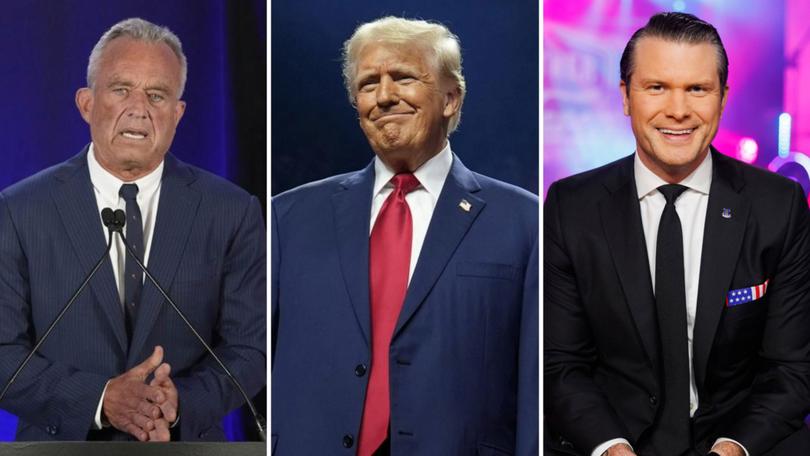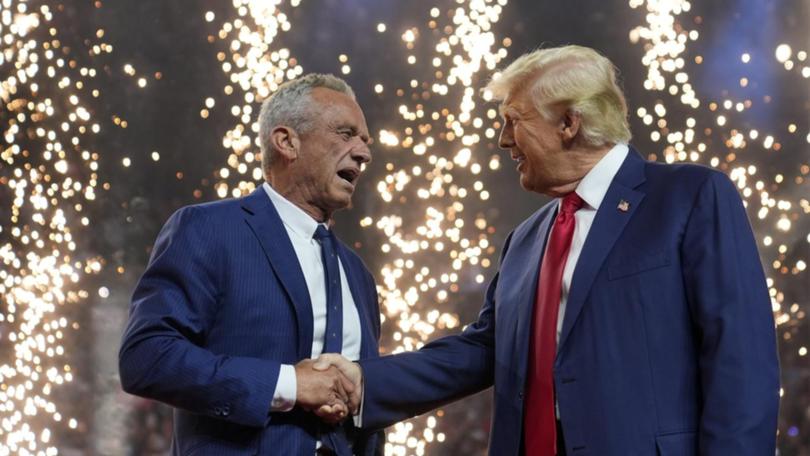President-elect Donald Trump and allies blur lines between politician and influencer
By assembling a crew of advisers from a hodgepodge of right-wing internet personalities and Fox News hosts, Trump has built America’s first influencer administration.

A few weeks before he was named to lead the Department of Health and Human Services, Robert F. Kennedy Jr. recorded a sponsored social media video for Boxbollen, an at-home boxing game featuring a head-strapped bouncy ball.
“Boxbollen!” he screamed after repeatedly punching the little ball in a video posted on his TikTok account; the video has since been deleted. Covered in sweat, he praised the product, which retails for $29.99, as “the ideal stocking stuffer.”
It was an unusual appearance for a recently withdrawn presidential candidate, much less a soon-to-be-incoming Cabinet secretary. But Kennedy — who has won millions of followers with extreme claims about health, including that the coronavirus vaccine is a “crime against humanity” — is one of several members of the incoming administration trying to blend politics with their personal brands as viral online personalities.
Sign up to The Nightly's newsletters.
Get the first look at the digital newspaper, curated daily stories and breaking headlines delivered to your inbox.
By continuing you agree to our Terms and Privacy Policy.The Boxbollen video highlights how some of the biggest names in President-elect Donald Trump’s orbit have capitalised on their social media fame in the run-up to his second White House term. By assembling a crew of advisers not from the ranks of career bureaucrats but from a hodgepodge of right-wing internet personalities and Fox News hosts, Trump has built America’s first influencer administration, potentially transforming how Washington reaches everyday Americans - and giving rise to new forms of conflict of interest.
The picks - like Trump’s private-jet group photos - seem designed to drum up attention, and the president-elect has announced many of his Cabinet nominations on Truth Social, the social media platform he owns a controlling stake in through his company, Trump Media & Technology Group.
But they could also help market Trump’s political ideas to a national audience. Vivek Ramaswamy, the former pharmaceutical executive, said recently that Trump’s initiative to slash federal spending - known as the “Department of Government Efficiency,” or DOGE - will be chronicled on a weekly podcast, or “DOGEcast,” that will expose “what exactly that waste, fraud and abuse in government looks like.”
The focus on social media could also offer Trump allies a chance at personal financial benefit. Trump has pledged to top-load his administration with people such as Pete Hegseth, the former “Fox & Friends” weekend show co-host who routinely promotes his book “The War on Warriors” in social media videos.
Shortly before Trump named him as his pick for defense secretary, Hegseth said in a two-hour interview with Navy SEAL-turned-podcaster Shawn Ryan that he’d fire “any general, any admiral” who was involved in “woke s---” and replace them with “no-nonsense warfighters … who aren’t going to cater to the socially correct garbage.”
Mehmet Oz, the celebrity doctor Trump named to lead the agency that administers the Medicare and Medicaid programs, told his millions of TikTok and X followers last week that they could reduce Thanksgiving stress “with adaptogens like ashwagandha from a trusted source like iHerb,” an online supplement store that says Oz serves as its “global advisor.” (An iHerb spokesperson declined to disclose the “financial nature” of its relationship with Oz and said there has been “no change to his affiliation” with the company since Trump named him to the role.)

Even those no longer part of Trump’s potential Cabinet have gotten in on the action. In the days since Matt Gaetz withdrew from consideration to lead Trump’s Justice Department, the recently resigned congressman has started selling $500 personalized messages on the influencer-video marketplace Cameo. (On Black Friday, they were offered at a 60 percent discount.)
“What’s up, Deb … this is Matt Gaetz,” he said in a Thanksgiving-themed video while wearing a white “MAGA” hat. “We just can’t thank you enough for being a part of what we’re doing for the country. Because it requires patriots at every level. We have to have folks who are praying for us … who are praying for President Trump, who are sharing important content online.”
Jess Rauchberg, an assistant professor at Seton Hall University who studies social media, said Trump allies’ moves online offer an example of what some researchers call “influencer creep,” in which traditional public figures start adopting the rhythms of digital creators to promote or reinvent themselves. She expects more leaders of both parties will “blend the boundary between politician and content creator” because it will offer them a path to widespread trust and prominence.
“To be a politician, you’re going to need to play the game like an influencer,” she said. But the risk, she said, is “when we are only focused on that moment of laughter or of interacting with the meme,” it can “hide and obfuscate who they are as a political leader.”
Federal employees are barred from using their public office to endorse products, given the potential conflicts between their government work and for-profit interests. In the early days of the first Trump presidency, the White House “counseled” adviser Kellyanne Conway after she was criticized for promoting Trump’s daughter Ivanka’s fashion and jewelry line by telling Fox News viewers to “go buy Ivanka’s stuff.”
One Trump ally, Rep. Lauren Boebert (R-Colorado), raised questions this past week when she briefly advertised her own $250 custom Cameo videos, despite House rules prohibiting representatives from being paid for appearances. Boebert’s account, which was listed under the “influencer” category, was removed Monday, two days after it appeared online. Her office did not respond to requests for comment.
“It’s obvious that she was looking to use her status as a member of Congress to solicit payments through Cameo, which is an absolute no-no,” said Donald K. Sherman, the deputy director of Citizens for Responsibility and Ethics in Washington and a former congressional oversight attorney. “Government service is about serving the public, not leveraging an election to boost your personal finances.”
In other cases, Trump allies’ online dealings probably do not violate federal guidelines, given that they have yet to officially take power. And as their social media audiences have multiplied over the years, so, too, have their attempts to benefit from their prominence.
Prominent Democrats have used social media, too, not to cash in on sponsored content but to reach voters or appear down to earth. Rep. Alexandria Ocasio-Cortez (D-New York), for instance, has discussed Medicare while streaming herself playing video games and answered constituents’ questions live on Instagram.
But no one has showcased the intersection between political and online influence quite like Trump, whose social media presence includes a 14-million-follower TikTok and a 95-million-follower X account. Before the election, Trump appeared on the comedy-interview podcast “Flagrant” and recounted a conversation he’d said he’d had with an aide recently about the supremacy of his online brand.
“I said, ‘Who is the biggest of all the influencers?’” Trump said, adding that the aide responded, ‘Sir, that’s the easiest question you’ve ever asked me. … You, sir.’”
Trump, a former competition-reality-show host who has licensed his name out for decades, has benefited from the attention by promoting branded products - including through posts on Truth Social. In recent months, he has used the platform to advertise Trump-branded Bibles, sneakers, photo books, “truly special” gold watches imprinted with his face and $10,000 eagle-emblazoned, Trump-autographed guitars.
Trump’s openness to social media influencers, particularly those on the right, could shape the White House’s strategy for navigating traditional media scrutiny and boosting its political talking points.
On an episode this week of “Triggered,” Donald Trump Jr.’s show on the right-wing video site Rumble, Trump’s oldest son told the conservative commentator Michael Knowles that he had just spoken with his father and the billionaire Elon Musk about the idea of replacing mainstream news organisations in the White House Briefing Room with podcaster Joe “Rogan and guys like you.”
“We had the conversation about opening up the press room to a lot of these independent journalists,” Trump Jr. said. “If the New York Times has lied … why not open it up to people who have larger viewerships, stronger followings?”
Other Trump-friendly media appearances could come from productions like “DOGEcast,” which Ramaswamy said in a TikTok video would outline his plans to decimate government spending and “strike the leviathan at its core.” Ramaswamy’s other podcast, “The Truth,” has featured interviews with right-wing commentators such as Ann Coulter and Alex Jones and promoted itself as helping expose “the truth about January 6th [and] how our money is being spent in Ukraine.”
Ramaswamy has yet to share details on when the “DOGEcast” will air or how it will function. But Musk, his co-leader in DOGE, said recently to his 200 million followers on his social media platform X that “we will have guests too.”
A strong focus on social media, however, could conflict with some of the new administration’s wide-ranging interests. Trump’s choice for surgeon general, Janette Nesheiwat, has said “social media has had a tremendous negative impact on all aspects of society” and called to ban teenagers from using it, saying “it’s done nothing but harm.”
When Kennedy posted his Boxbollen video, it made an instant splash, drawing a million views in half an hour, Boxbollen’s Sweden-based co-founder Jacob Eriksson told The Washington Post. The video, however, did not disclose that it was an advertisement, as required by the Federal Trade Commission’s rules for social media endorsements. Kennedy’s account removed it shortly after posting and canceled the contract, which had been signed before Kennedy was named for the HHS role, Eriksson said.
In the days since Kennedy deleted the video, Boxbollen reposted it to its Facebook, Instagram and TikTok accounts, where it has been “liked” thousands of times. Eriksson declined to share the financial terms of their deal with Kennedy, though he said the company has paid other celebrities; its roster of endorsers includes Tom Brady and Khloé Kardashian. A Kennedy representative did not respond to requests for comment.
The company tapped Kennedy not because of his politics, but his personal fitness at the age of 70 and his thoughts around health, exercise and clean eating, Eriksson said. But he believes more political figures will continue to seek internet influence.
“It’s good for them to have a connection with their followers, straight, without any middlemen,” he said. “When it’s TV, [it’s] very filtered often. When it’s on social, they can say what they want.”
© 2024 , The Washington Post
